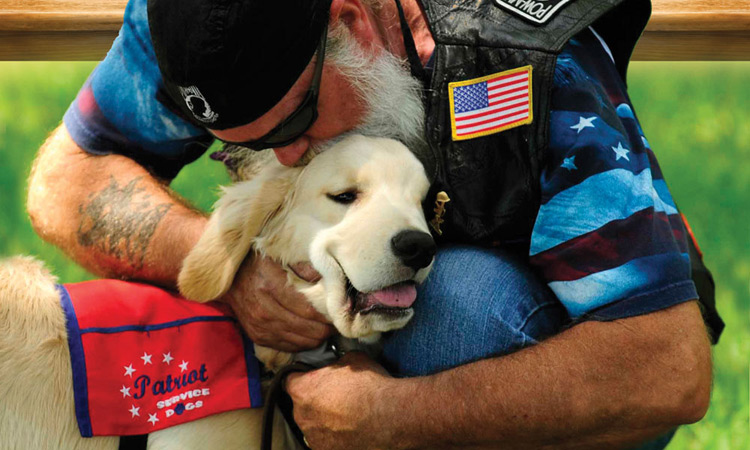 War is hell, goes the old adage. But so can life be after returning home from the battle. More than 540,000 veterans of the wars in Iraq and Afghanistan suffer from Post Traumatic Stress Disorder (PTSD) or depression. In addition, more than 260,000 veterans have been diagnosed with traumatic brain injuries, not including World War II and Vietnam War veterans, according to a Rand Corporation study.
War is hell, goes the old adage. But so can life be after returning home from the battle. More than 540,000 veterans of the wars in Iraq and Afghanistan suffer from Post Traumatic Stress Disorder (PTSD) or depression. In addition, more than 260,000 veterans have been diagnosed with traumatic brain injuries, not including World War II and Vietnam War veterans, according to a Rand Corporation study.
The road to recovery is often long and difficult. But there are always reliable and furry friends who can help— service and therapy dogs, often rescued from shelters and specially trained for their vital jobs. They provide comfort, emotional support and companionship, in addition to loyalty and love for their owners.
In the new book by award-winning author and photographer Tracy Libby, Reporting For Duty: True Stories of Wounded Veterans and Their Service Dogs, 15 disabled veterans from WWII, Vietnam, Iraq and Afghanistan are shown how they are overcoming a wide range of physical and emotional challenges with the help of their service dogs, some of which saved their lives. A portion of proceeds from the sale of the book helps a veterans’ service-dog organization.
Libby writes: “These stories paint a picture of our nation’s heroes who served during the wars…Ordinary Americans who accomplished extraordinary feats to protect the liberties we hold dear—and the extraordinary dogs who now serve those heroes by reporting for duty 24 hours a day, seven days a week. Dogs who became instant therapists, comforting and watching over those struggling with recurring dreams, panic attacks, crippling migraines, insomnia, fear, agoraphobia, loneliness and the grief associated with the loss of fellow soldiers. Dogs who guide the blind, retrieve objects, and open and close doors for the physically disabled. Dogs who interrupt nightmares, respond to seizures, and hit buttons that dial 911.”
Take the case of retired Sgt. Major James Kuikenk, who joined the Marine Corps in 1973 and saw plenty of combat during his 30 years of military service, with deployments to Bosnia, Kosovo, Kuwait, Iraq and Afghanistan: “My country was at war, and I wanted to do my part,” he says.
But it took him years to realize he suffered from PTSD and Traumatic Brain Injury (TBI). At first, Libby writes, like many veterans, he didn’t think he needed help. But as the years passed, his PTSD only got worse. He spent almost all of his time sitting in a chair in his living room, sometimes for days at a time, doing nothing. “I didn’t interact with other people or even my family,” he says.
Finally, Kuikenk realized he was in a very dark place and needed help. Not only was he dealing with the invisible wounds of PTSD, but also the physical fallout from multiple deployments into direct combat, including an explosion that had fractured his spine, damaged his heart and lungs, and blown out both of his knees. A TBI left him cognitively affected with vision, hearing, memory and balance issues.
The book also covers the different types of dogs that help veterans, including assistance dogs, guide dogs and PTSD dogs. There are also chapters on the socialization and training process that service dogs go through, and the history of canine-assisted therapy and its evolution into specialized jobs, including combat operational stress-control dogs and co-therapy dogs at military facilities.
Knowing that Kuikenk had dogs all of his life; someone suggested that a companion dog might help with his PTSD. When he did some research, he realized he actually needed a service dog. And then he found Freedom, a young black Labrador Retriever, just skin-and-bones, held in an animal shelter with only a week or two to live.
Freedom was bailed out and sent to K9s For Warriors, a nonprofit organization in Ponte Vedra Beach, Florida that researches and trains dogs. Founded in 2011 by Shari Duval, who was inspired by her son, a dog-handler who returned from two tours in Iraq with PTSD, the organization has trained and donated more than 170 service dogs at no cost to active-duty troops and post-9/11 veterans suffering from PTSD or TBI.
After six to eight months of basic obedience training and another four months of specialized training specific to wounded veterans, Freedom was matched with Kuiken, who traveled 750 miles to Florida to spend three weeks with the organization’s intensive live-in program.
“Freedom opens me up emotionally,” says Kuiken. “I’m much more sociable. I actually talk to people now. I’ve reconnected with my family—my wife, kids, sisters, brother—people I haven’t communicated with in a long time,” he says.
These inspirational stories show veterans who have overcome great challenges, both physical and emotional, toward healthier lives with the help of service dogs. It shows that we all need companionship—whether a helping hand or paw—to bring us out of ourselves and back, reengaged, in the world.
Click here to find out about Rose’s thoughts on wellbeing and health


